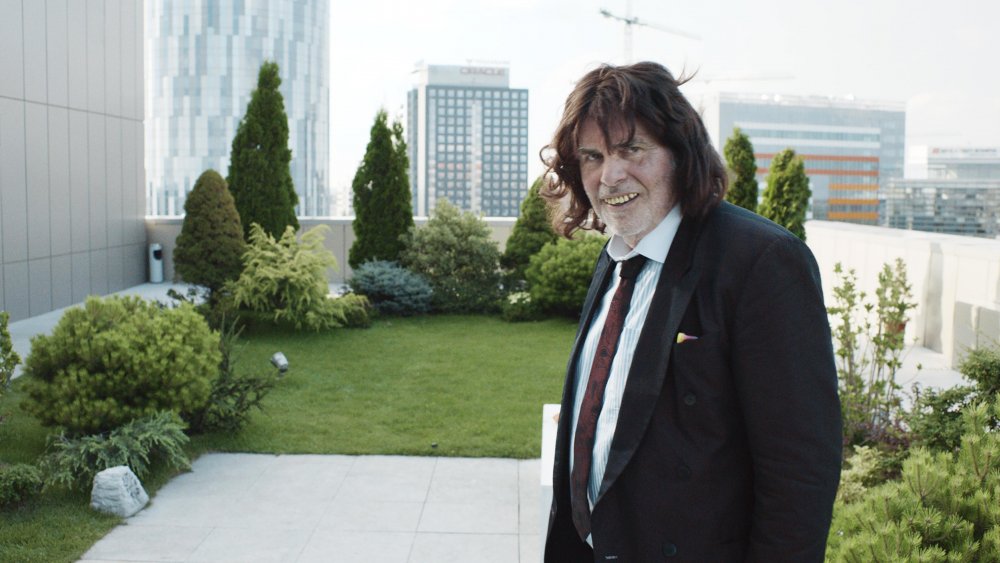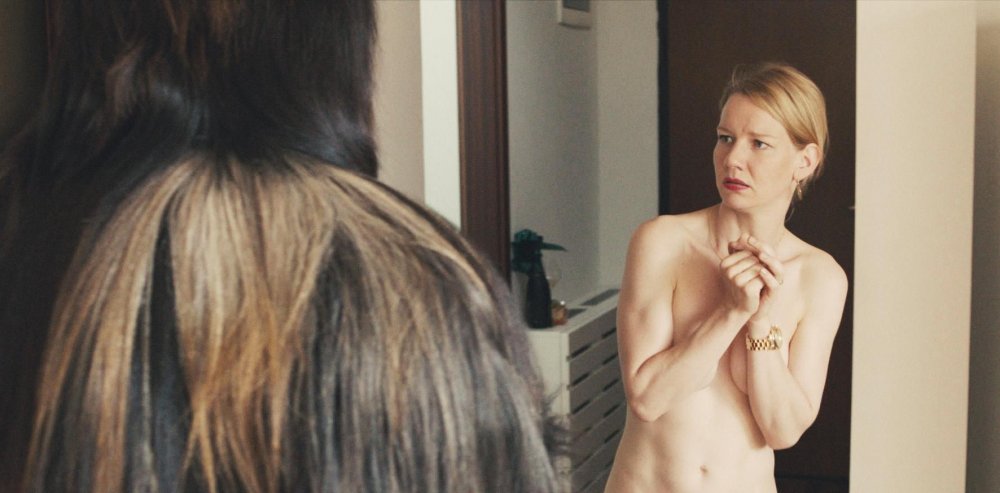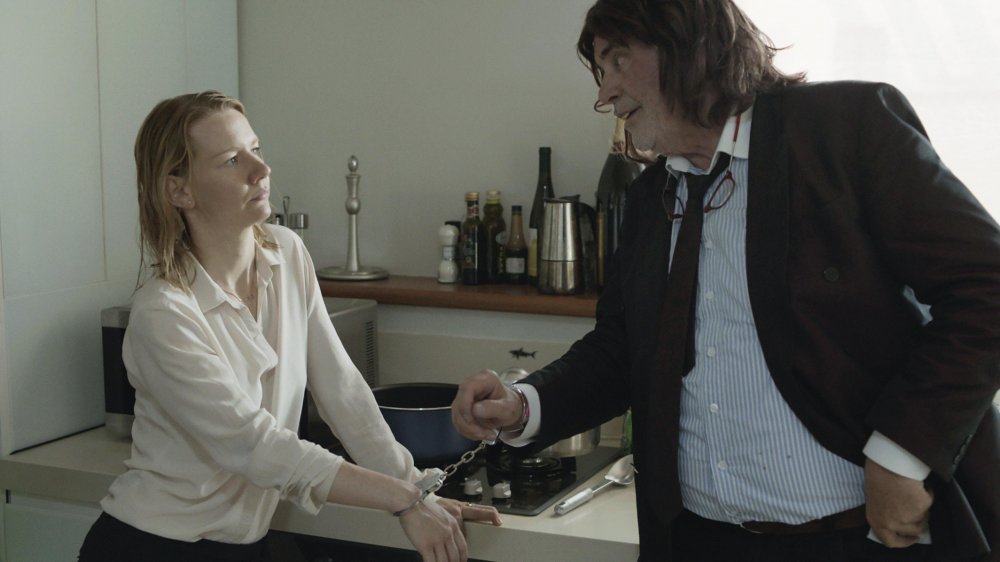‘Feelgood moments’ are, I imagine, something that Sight & Sound readers generally feel a little suspicious of. What’s more, you don’t very often encounter them in Cannes, certainly not in competition, and you certainly wouldn’t expect to come across one in the work of a highly-considered up-and-coming German auteur.
Germany 2016
162 mins
Director Maren Ade
Cast
Ines Sandra Hüller
Winfried / Toni Peter Simonischek
► Trailer
But there is quite an extraordinary feelgood moment in Maren Ade’s Toni Erdmann – and it’s one that’s well earned over the course of a leisurely two and three-quarter hours. The scene involves a somewhat buttoned-up character finding herself reluctantly singing Whitney Houston’s super-saccharine, mawkishly life-affirming The Greatest Love of All at a strangers’ party – then throwing herself body and soul into her passionately off-key performance. The scene earned Sandra Hüller a spontaneous round of applause at the evening press screening, and it’s one of the reasons why Ade’s film is looking set to be one of the competition’s very best.
Toni Erdmann isn’t, despite the title, the story of one person but two – it’s about a father-daughter relationship, and it’s as much the daughter’s as the father’s story. But ‘Toni Erdmann’ the character is the terrain where the duo’s encounter happens – it’s a sort of consensual therapeutic fiction that allows their overdue reunion to take place.
Austrian stage actor Peter Simonischek plays Winfried, an elderly, divorced music teacher from Aachen, whose life seems to scrape by – judging from the opening sequence – on a series of half-baked pranks and improvised comic fictions. We see him pretending to be his own brother to perplex a postman, then wearing skull make-up for a school event and cracking jokes about getting paid to dispatch residents of old-age homes. He’s shambling, affable, bear-like: we guess that he’s a bit of a generation-of-68 guy, and take to him instantly.
But we can also imagine that he’s hard work to be around – which would explain the coolness shown towards him by his daughter Ines (Hüller), briefly in town from Bucharest, where she works in consultancy for an oil company. The film’s opening doesn’t tell us much about either character’s character, but Ines too is established in concise strokes as someone who has embraced the corporate life and a certain detached idea of success, no doubt in revolt against her go-with-the-flow dad.

After Winfried’s aged dog dies (and has any film ever made less fuss about a canine death?), he flies on a whim to Bucharest to spend time with Ines, who’s clearly embarrassed by his presence but puts on her best sang froid face and invites him to a stuffy reception. Suddenly she finds she can’t get rid of him: one minute he’s making facetious small talk with her boss, the next donning a preposterous wig and comic false teeth and introducing himself as ‘Toni Erdmann’, variously a corporate lifestyle coach or the German ambassador.
There’s a lot of fun to be had in the way that ‘Toni’ simply turns up, like a benign but troublesome spirit summoned up by Ines’s repressed need for fatherly company; but there’s also a discomforting element to it, as Ines is essentially being stalked by her own dad, a man who simply can’t seem to see when he’s getting in the way, crossing boundaries, or causing her grief.
But there are also long passages where Toni/Winfried drops out of sight, and the film shifts from comic mode to provide a dispassionately realist evocation of Ines’s life. Her existence is a series of nervous manoeuvres in a soulless world where she’s expected on one hand to constantly please her bosses, while throwing her own weight around as a businesswoman who knows what she wants (in a beautifully to-the-point scene, she throws a clipped strop at a waiter in a spa: there’s always someone else below you in capitalism’s chain of humiliation).
The film is very acute on the dehumanising nature of the corporate world, as in a scene where Winfried protests against an oil worker’s sacking – for which he’s accidentally responsible – and Ines reminds him that sacking people is essentially her job as a consultant. Setting the film in Bucharest – the site, we’re told, of Europe’s biggest shopping mall, although no-one can afford to shop there – we see the glossy world of economic success as a sort of Dubai-like bubble, where corporate personnel inhabit a shiny hermetic globe of their own, acting out their own rituals, while ordinary people are left to struggle outside. The film acutely catches the way that artificial social structures create their own mores – Ines’s status in a very male milieu emerges in an excruciating scene of hotel sex with her unappetising lover Tim (Christian Pütter), whose boss has told him to fuck her enough to smooth her edges but not soften her ‘bite’.
All in all, Toni Erdmann contains all the material to provide us with a super-bleak depiction of the effect of managerial culture on social relationships – something that, here, it takes compassionate buffoon Winfried to cut through, not unlike the hero of Ken Loach’s similarly humane competition entry I, Daniel Blake. [See our review.] But the comic flourishes and outrageous situational wit of Toni Erdmann are little less than magical. There are two extraordinary moments that really lift the soul: the Whitney routine, and a disastrous party that Ines holds at her apartment, a scene that suggests her being on the verge of breakdown but then erupts into a joyous panorama of surreal social embarrassment.

Ade proved herself to be a terrific director of actors in her two previous films, The Forest for the Trees (2003) and 2009’s Berlin hit Everyone Else (2009). She’s perfectly teamed here with Hüller, from Hans-Christian Schmid’s Requiem and Jessica Hausner’s Amour Fou, whose taut mask-like features hint subtly at the deep well of disappointment, and of misdirected strength, within Ines; and with Simonischek, resembling a bulkier, shaggier Alejandro Jodorowsky, as an uncontainable figure whose geniality and melancholy are mesmerising and infuriating in equal measure.
The visual style is soberly realist, Patrick Orth’s photography strictly no-frills, but perfectly captures the different social spaces that Winfried moves through, especially the glassiness of the ‘lifestyle’ world, and it’s perfectly attuned to a film that lets the acting and the situations lead.
Pretty much any précis of Toni Erdmann would suggest a Hollywood relationship comedy, and you’re really glad it’s not that; although you could all too easily imagine a US remake, directed by Jason Reitman, say, and starring perhaps Bill Murray and Kristen Wiig. Maybe that wouldn’t be that bad, but the Whitney Houston moment wouldn’t feel so wonderfully incongruous. Let’s hope it doesn’t happen; Toni Erdmann is too magnificent to dilute.
-
Cannes Film Festival 2016 – all our coverage

Browse all our coverage of the preeminent showcase of international and auteur cinema.
-
The Digital Edition and Archive quick link
Log in here to your digital edition and archive subscription, take a look at the packages on offer and buy a subscription.







